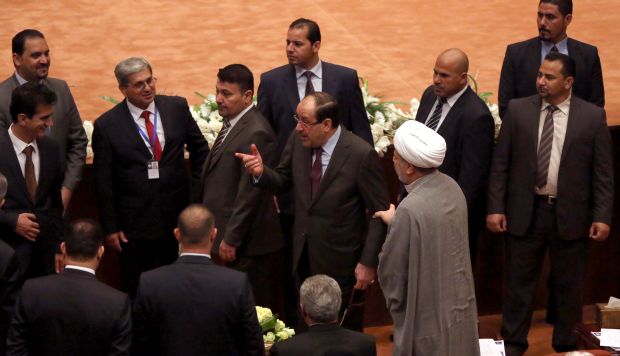
Iraqi Prime Minister Nuri Al-Maliki (center) greets lawmakers at the first session of the newly elected parliament in the heavily fortified Green Zone in Baghdad, Iraq, on Tuesday, July 1, 2014. (AP Photo/Hadi Mizban)
Baghdad, Asharq Al-Awsat—Iraq’s outgoing prime minister and speaker of parliament have been offered the posts of vice president, along with Iraqiya bloc leader Iyad Allawi, as Iraqi Prime Minister-designate Haider Al-Abadi seeks to announce a new government before a September 10 deadline.
In addition to Allawi, outgoing PM Maliki, who is the head of Abadi’s own State of Law coalition, as well as former speaker Osama Al-Nujaifi, head of the Sunni-majority Mutahidoun coalition, have been offered the largely ceremonial posts of vice president, sources told Asharq Al-Awsat.
Iraq traditionally has three vice presidents; a Sunni, a Shi’ite and a Kurd. If all three candidates accept, Iraq’s Presidency Council would be missing a Kurdish representative; Allawi and Maliki are Shi’ites while Nujaifi is a Sunni. Iraq’s President, Fuad Massoum, is a Kurd, as is traditional according to the post-Saddam sectarian power-sharing system.
In comments to Asharq Al-Awsat Iraqiya bloc MP Maysoon Al-Damluji said: “Allawi has agreed to assume the post of Vice President on the condition that he is given broad powers, particularly within the framework of achieving national reconciliation, the dossier he has been tasked with overseeing.”
“National reconciliation has been one of the major problems facing the country over the past years . . .that led Iraq to the situation it is facing today,” she added.
The Iraqiya bloc MP defended Allawi’s conditions in the face of accusations of brinkmanship, maintaining that the moderate Shi’ite figure has a “comprehensive [national reconciliation] project,” and is “accepted by everyone.”
The Iraqiya bloc will also be given two ministerial portfolios by Abadi, however negotiations are ongoing regarding which ministries and ministers will be appointed.
Sources close to Abadi informed Asharq Al-Awsat that certain political parties are seeking to impede the formation of a new government by putting forward unreasonable demands, with the prime minister-designate under increased pressure to announce a cabinet before the deadline next week.
Iraq’s Sunni community, largely political disenfranchised under the Maliki administration, have called for Abadi to offer them “guarantees” before they will agree to join his government. Abadi had pledged to form a national unity government that includes all segments of Iraqi society, particularly the Sunnis and Kurds.
Sunni Iraqi Forces Alliance MP Mohammed Al-Khaledi told Asharq Al-Awsat: “The problem for us is not in the [distribution of] ministerial portfolios but in the fact that the memorandum of demands that we submitted has not been signed by the political blocs.”
The Sunni politician said there were two opposing camps within the Shi’ite-majority Iraqi National Alliance that is backing Prime Minister-designate Abadi, saying that one camp does not wish to accede to the Sunni demands.
If the conflict over Sunni demands continues within the ruling alliance, Sunnis would largely remain “unenthused about participating in the government,” Khaledi said.

Trackbacks/Pingbacks